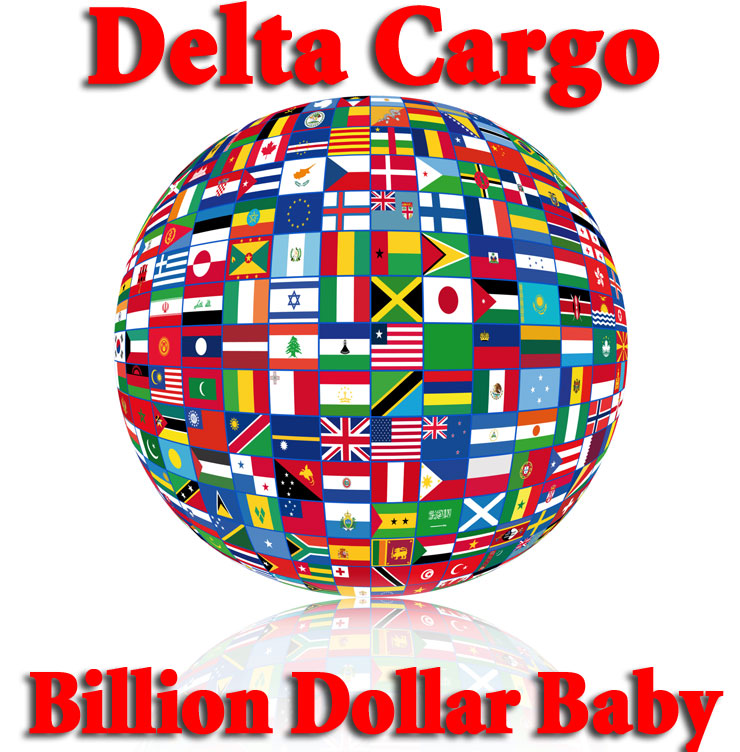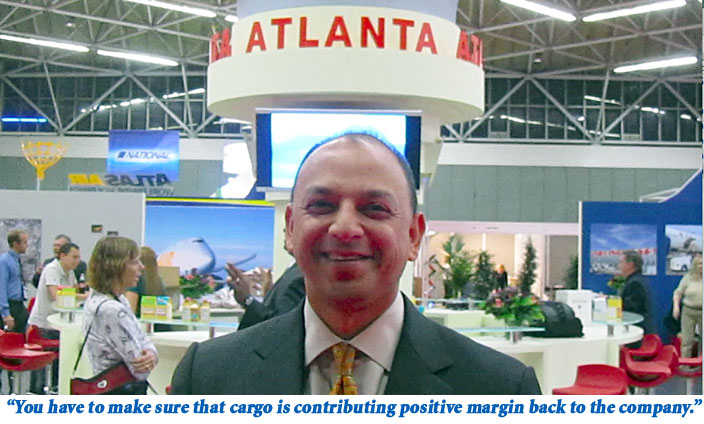
Neel
Shah departed a promising career at United Cargo to take the top job as
Vice President Cargo at Delta Air Lines a couple of years back. Almost
before he could digest the change, he woke up one morning plus Northwest
Airlines as chief cargo officer of the biggest airline in the world.
If he is concerned about his place in air
cargo history, he sure doesn’t show it; in fact, right now Neel
Shah is all about the job and the monumental changes taking place at Delta
Cargo.
“They (Delta) came looking for me,”
Neel says, “but everybody made it clear right away that the airline
is deadly serious about building its cargo product.
“Air cargo is a top down priority
here, best exemplified when we went back to the USPS after Delta had quit
mail some years back.
“It was Richard Anderson and me at
the U.S. Post Office, face to face up in Washington with Delta basically
saying ‘we want your business back.’”
“We presented ourselves and they said
yes and the rest, as they say, is history.
“Today, Delta is once again a top
producer for the USPS and the numbers just keep getting better.”
The return is significant.
Back in 1975, another Delta Cargo chief,
the great John Pogue, told this reporter, “Air mail and express
is a major contributor to every Delta flight-especially at night,”
Back in the day, the air cargo boss was
situated above the handling facility in an office that featured a small
window, which allowed John to peer out and watch the cargo move across
the floor below.
 |
Today, Delta Air Cargo is energized and
directed from an office complex inside a group of Georgia clay-colored,
red brick buildings that serve as world headquarters for the carrier in
Atlanta, Georgia.
We are reminded that the airport this carrier
has dominated ever since it was built, Hartsfield Jackson International
Airport, is close by; aircraft can be seen coming and going 24/7 from
the bright, spacious windows at company HQ.
Neel Shah is not a big man.
He is built compact, but his ideas fill
the room to overflowing.
Shah has his eyes on the prize and is determined
to get Delta Cargo right and profitable.
“When we made the decision to retire
the freighters after the Northwest merger, it had to do with the fact
that at the end of the day, it is not about top line revenue.
“You have to make sure that cargo
is contributing positive margin back to the company.
“Generating one billion in top line
and 1.3 in costs just doesn’t cut it.
“Last year almost everybody found
themselves upside down and the downturn was amplified in air cargo, as
passenger yields did not fall 60 percent as air cargo did in some cases.
“Delta is an airline that has been
transformed since Richard Anderson came onboard.
“Today, this company has a very clear
vision and focus.
“Richard does not bring the baggage
of a pre-determined outcome either.
“Delta has a very clear vision and
focus to growing our collective enterprise in both passengers and cargo,
while generating the highest operating margins in this industry.
“We will show it as we move through
the Q3, earning season. The impressive numbers are even more dramatic
when it is recalled that in 2007 Delta was target of a hostile takeover
by US Airways.
“Today, we are the most profitable
airline in the world.
“Delta is a remarkable turnaround
story.
“We are going to do between $845 and
$860 million in 2010.
“My goal is for Delta Cargo to get
to one billion dollars of revenue by the end of 2012 as a belly-only carrier,
while driving a powerful amount of revenue back to the corporation.
“How we get from here to a billion
dollar air cargo business is not with a silver bullet, but rather the
number is achieved by attention to several elements of our business, including
focus on higher yielding products such as pharma, and high-val consignments,
plus introduction of some new domestic products that will tag onto our
Delta Dash services, offering highly specialized services to specific
industries.
“We are also continuing our ongoing
efforts to tighten up our air cargo business, making sure that there is
less and less revenue leakage.
“We need to do a better job at collections
due us, and also examining the process to make sure we are getting it
right by bringing our focus down to something as simple as dimming and
weighing freight.”
One addition is an incentive system for
the Delta Cargo sales force.
“My belief is that you cannot have
truly motivated sales without an incentive component.
“Delta is comfortable putting our
money where we are certain it will generate a return.
“The next step is: how do I create
an incentive program for our revenue and data management people who will
lead our sales people toward securing higher yielding traffic?
“We are investing in software that
will optimize cargo usage of our aircraft based on fifteen different sources
of data, which allow us to have much better forecasts as to how much freight
we are able to carry.
“Delta Cargo continues to build functionality
onto our existing software; that helps take us to the next level to include
hurtle rate pricing, etc.
“Our march toward one billion includes
laser-like focus on the operation, because we all realize full-well that
at the end of the day, you can only sell effectively if you can move the
freight.”
“It is no secret that Delta is a carrier
that traditionally was not focused on the air cargo business.
“In terms of service, we are investing
in the right people and the right technology that sets us up for success.
“Air cargo is about moving the goods
and providing the information, and we do not underestimate the importance
of transparency.
“We are going to provide more robust
information to our shippers by investing in end to end scanning technologies
and other applications.
“That means full warehouse and planeside
scanning that closes shipments out and tells us with a great degree of
certainty where everything is in our system.
“Applied to our Dash System, that
is a multi-million dollar business with very sound margins, which carries
(among other consignments) organ transplants and other vital shipments;
this enhancement to our product is do or die to an entire segment of shippers
that rely on total information.
“Delta Cargo has 120 people involved
in sales worldwide and I think they are the best anywhere.
“Communication and basic support are
key and we are ramping up data and information to empower everybody.
“Everybody needs to know what to expect.”
Neel Shah spent five years at United Cargo
and the past three years in Atlanta as top cargo officer at Delta Cargo.
Neel actually moved into air cargo from
the passenger side at UAL, where he worked for the airline a total of
ten years.
Neel studied for his MBA at Columbia (NYC)
where he mastered in finance and organizational strategy.
“I moved into cargo by absolute circumstance—actually,
I was at the part of UAL that was focused on “new ventures”—doing
business development like Orbitz-Hotwire and other ventures.
“Then 911 hit and guess what? All
the big fancy ideas went out the window as everybody was suddenly battling
for survival.
“I was lucky to be directed by the
then UAL CFO, Doug Hacker, into cargo, although at first I thought the
business was a step down.
“Doug said, ‘Cargo will be fun
and offer lots of opportunities for you,’ and he was spot on right.
“I knew nothing about cargo, but I
tell you, I just fell in love with this business because unlike the passenger
business, air cargo is a high concentration of repeat customers and relationships
that are critical to success.
“I was immediately blown away by the
difference, but also by the opportunity.
“A few years later, when I learned
that I was on the short list to come to Delta Cargo, my first reaction
as a United guy was:
“‘I love selling against Delta
Cargo.’
“But I was convinced that under Richard
Anderson, it was a new deal to reengineer Delta Cargo.
“Now it’s three years later,
and I consider being here the best decision I ever made.
“When you are on the outside and hear
about the ‘Delta Culture’ and the ‘Delta Difference’
you cannot appreciate what that means until you are inside the company
and realize that this airline is something special.
“Management here protects and enhances
that culture that is about 80 years of history and all this company and
its people have gone through.”
We asked Neel Shah how the 100 percent screening
of all belly cargo mandate of TSA has impacted Delta Cargo business?
“Screening was to air cargo what Y2K
was to the change of the century a decade ago.
“Leading up to 100 percent, we spent
a lot of time and trust me, a lot of money preparing for the change.
“When the date (this past August 3)
for 100 percent arrived, for me it was after a sleepless night wondering
what would happen, because that is what most of us were programmed to
wonder.
“At the end of the day, the cargo
is flowing very well throughout our system.
“Sure, we have the occasional hiccup—a
truck arrives without a security seal, things like that—but we have
been working well through just about everything, with our forwarder partners
right onboard with us.
“There are still a number of challenges,
not the least of which will be all the inbound screening that soon will
have to be at 100 percent.
“Some other issues, such as handling
of human remains, still have to be worked out between the airlines and
TSA
“The evolution of technology is something
we must also pay attention to, because the mandates will change.
“Air cargo security is not a ‘one
and done’ situation.
“Our infrastructure is set up to handle
screening, but we need to constantly update and be ready for change.
“We have to continue to encourage
forwarders and especially shippers to focus on the security mandates,
and for shippers that means at the point of manufacture.”
Geoffrey/Flossie |






